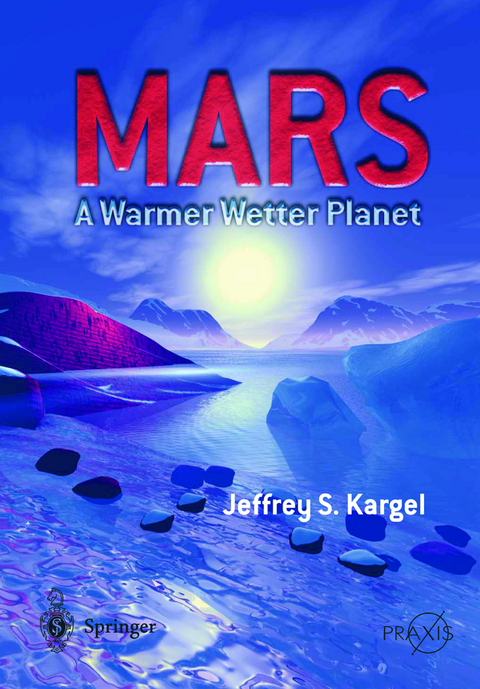
Mars - A Warmer, Wetter Planet
Seiten
2004
Springer London Ltd (Verlag)
978-1-85233-568-7 (ISBN)
Springer London Ltd (Verlag)
978-1-85233-568-7 (ISBN)
Offers a presentation of the evidence that Mars was a relatively warm and wet place and that there are vast reserves of water frozen beneath the planet's surface. This book includes various pictures. It also helps the reader learn about the process of science.
Mars is the Solar System's other wild, wet, water world. Long believed to have become cold, dead, and dry aeons ago, we now having striking new proof, not only that Mars was a relatively warm and wet place in geologically recent times, but that even today there are vast reserves of water frozen beneath the planet's surface. This compelling new evidence may well boost the chances of a manned mission to Mars sooner, rather than later. The discovery is also forcing a complete rethink about the mechanisms of global planetary change. What does the drastic turn of events on Mars mean for Earth's climate system? Could life have thrived on Mars very recently, and might it survive today in short-term hibernation? Will humans soon be capable of living off the natural resources that Martian hydrogeology has naturally offered us? Will humans one day be capable of setting off the same chain of events that nature has repeatedly triggered to set off warm, wet episodes on Mars? How could Mars be terraformed into a New World? (And should we even contemplate doing so?) This book offers a visually beautiful, scientifically detailed and accurate presentation of the evidence that has forced this new revolution in Mars science.
From the reviews:
"Long believed to have been cold, dead and dry for eons, there is now striking new proof that not only was Mars a relatively warm and wet place in geologically recent times, but that even today there are vast reserves of water frozen beneath the planet’s surface. In this absorbing, beautifully illustrated book, Kargel describes the still-unfolding revolution in our knowledge about the Red Planet and how future concepts of Mars will continue to be molded by new revelations of four billion years of geology". (LUNAR AND PLANETARY INFORMATION BULLETIN)
From the reviews:
"
This exhaustive, effusive, and enthusiastic book conveys the excitement of frontline scientific research aboutas well as can be done. Kargel describes himself as a member of the "Tucson Mafia," a group of scientists in full rebellion against the "Mars Establishment" and its belief in a cold, dry Mars. His ideas are presented in meticulous detail, supported by hundreds of superb pictures, many taken by the author himself. Some--perhaps most--of his ideas are controversial and may ultimately prove to be wrong, as he himself often points out, but we have to applaud the (sometimes career-risking) courage with which he has pursued them. In spite of the large amount of rather technical information, the reader is swept along by the author's enthusiasm in conveying it and ability to integrate it into a coherent vision. The reader also learns about the process of science: the thrill of having a new idea and discussing it with others at conferences and cafes (and bars), the drudgery often involved in pursuing the idea, the perils of the formal review process for publications and grant applications, and the roles played by personality conflicts and power politics. Summing Up: Enthusiastically recommended. All levels. " (T. Barker, CHOICE, March 2005)
Mars is the Solar System's other wild, wet, water world. Long believed to have become cold, dead, and dry aeons ago, we now having striking new proof, not only that Mars was a relatively warm and wet place in geologically recent times, but that even today there are vast reserves of water frozen beneath the planet's surface. This compelling new evidence may well boost the chances of a manned mission to Mars sooner, rather than later. The discovery is also forcing a complete rethink about the mechanisms of global planetary change. What does the drastic turn of events on Mars mean for Earth's climate system? Could life have thrived on Mars very recently, and might it survive today in short-term hibernation? Will humans soon be capable of living off the natural resources that Martian hydrogeology has naturally offered us? Will humans one day be capable of setting off the same chain of events that nature has repeatedly triggered to set off warm, wet episodes on Mars? How could Mars be terraformed into a New World? (And should we even contemplate doing so?) This book offers a visually beautiful, scientifically detailed and accurate presentation of the evidence that has forced this new revolution in Mars science.
From the reviews:
"Long believed to have been cold, dead and dry for eons, there is now striking new proof that not only was Mars a relatively warm and wet place in geologically recent times, but that even today there are vast reserves of water frozen beneath the planet’s surface. In this absorbing, beautifully illustrated book, Kargel describes the still-unfolding revolution in our knowledge about the Red Planet and how future concepts of Mars will continue to be molded by new revelations of four billion years of geology". (LUNAR AND PLANETARY INFORMATION BULLETIN)
From the reviews:
"
This exhaustive, effusive, and enthusiastic book conveys the excitement of frontline scientific research aboutas well as can be done. Kargel describes himself as a member of the "Tucson Mafia," a group of scientists in full rebellion against the "Mars Establishment" and its belief in a cold, dry Mars. His ideas are presented in meticulous detail, supported by hundreds of superb pictures, many taken by the author himself. Some--perhaps most--of his ideas are controversial and may ultimately prove to be wrong, as he himself often points out, but we have to applaud the (sometimes career-risking) courage with which he has pursued them. In spite of the large amount of rather technical information, the reader is swept along by the author's enthusiasm in conveying it and ability to integrate it into a coherent vision. The reader also learns about the process of science: the thrill of having a new idea and discussing it with others at conferences and cafes (and bars), the drudgery often involved in pursuing the idea, the perils of the formal review process for publications and grant applications, and the roles played by personality conflicts and power politics. Summing Up: Enthusiastically recommended. All levels. " (T. Barker, CHOICE, March 2005)
Foreword by Apollo 17 Astronaut Jack Schmitt - former US Senator and the last human to have walked on the lunar surface.- Imagining.- Watershed.- Warm, Wet, Early Mars.- Oceanus Borealis.- Outbursts, Outwash, and Outrage.- Life Etched in Stone.- We Will be Martians.- Stepping Stone to the Stars.
| Erscheint lt. Verlag | 30.8.2004 |
|---|---|
| Reihe/Serie | Space Exploration | Springer Praxis Books |
| Zusatzinfo | 185 Illustrations, black and white; XLVIII, 558 p. 185 illus. |
| Verlagsort | England |
| Sprache | englisch |
| Maße | 170 x 250 mm |
| Themenwelt | Naturwissenschaften ► Geowissenschaften ► Meteorologie / Klimatologie |
| Naturwissenschaften ► Physik / Astronomie ► Astronomie / Astrophysik | |
| ISBN-10 | 1-85233-568-8 / 1852335688 |
| ISBN-13 | 978-1-85233-568-7 / 9781852335687 |
| Zustand | Neuware |
| Haben Sie eine Frage zum Produkt? |
Mehr entdecken
aus dem Bereich
aus dem Bereich
Grundlagen – Maßnahmen – Planungen
Buch | Hardcover (2021)
Springer Fachmedien Wiesbaden GmbH (Verlag)
CHF 209,95
das Wolkenbuch für alle
Buch | Softcover (2024)
Seifert Verlag
CHF 27,95
A User Guide for Offshore Renewables and Oil & Gas
Buch | Hardcover (2024)
Whittles Publishing (Verlag)
CHF 78,55


